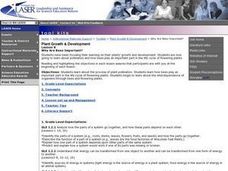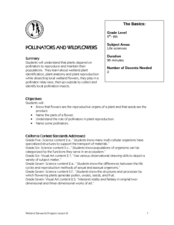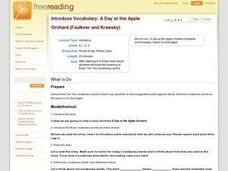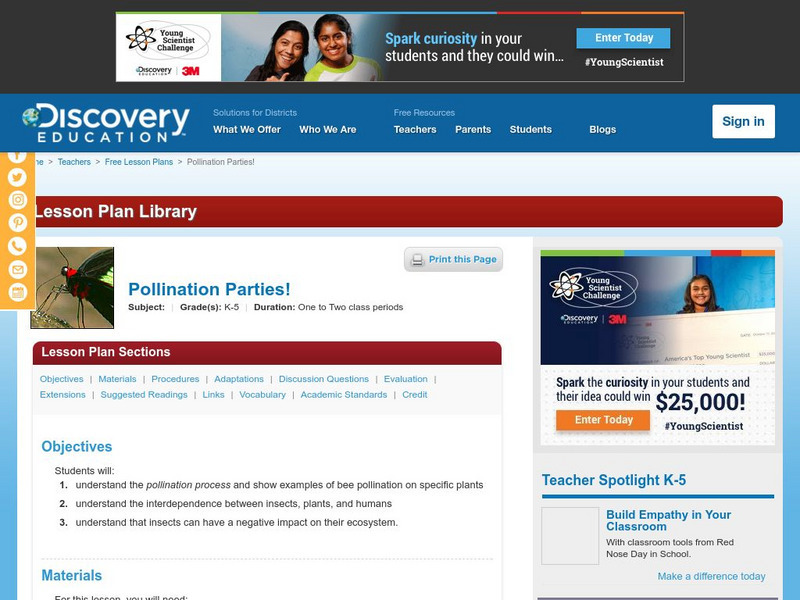Curated OER
The Honeybee Life Cycle
For this the honeybee life cycle worksheet, 3rd graders study the diagram of 6 stages in a honeybee's life, then fill in 3 short answer questions.
PBS
Reading Adventure Pack: Bees
A Reading Adventure pack explores the busy life of bees. After reading a fiction and nonfiction text, scholars complete three hands-on activities. Participants invent a robot that can do the work of bees, cheers to hardworking bees with...
Curated OER
Little Bees, Big Potential
After reading an article on the alfalfa leafcutting bee, learners chart its characteristics alongside those of the honeybee. Then they draw the leafcutter lifecycle. The article provides fascinating reading when studying the role of...
Curated OER
Why Are Bees Important?
Students identify and analyze pollination and how bees play an important part in the life cycle of flowering plants. They also identify the process of plant pollination and how bees play an important part in the life cycle of flowering...
Curated OER
Those Busy, Buzz'n Worker Bees
Students research information on worker bees. In this insect lesson, students review the body parts of insects and how bees find flowers. They discuss compound and simple eyes and the life cycle of a worker bee.
Core Knowledge Foundation
Plants Tell It Again!™ Read-Aloud Anthology
A 190-page anthology explores the life and parts of plants, flowers, and trees while boosting reading comprehension skills. Literature and informational texts showcase Johnny Appleseed and George Washington Carver. Lessons...
Curated OER
Interesting Insects
Students discover the characteristics of insects. They explore insects through cooperative learning, group projects, hands on activities, and poetry. They gain knowledge of insect life cycles, habitat, and physical characteristics.
Curated OER
Cyber Bee Hunt
Students research bees. In this organisms lesson, students participate in a WebQuest to gather information about bees. Students research the different kinds of bees, their body parts, and how they communicate. There is an included...
Curated OER
Who Wants to be a Millionaire? Human Body Systems and Plants
Fifteen multiple choice questions review a variety of biology topics. In game-show fashion, viewers answer questions about a plant's needs, the skeletal system, and the cardiovascular system. If you happen to teach these three topics...
Curated OER
The Greatest Show on Earth: The World's Smallest Animals
Students create instruments to capture different types of insects. In this The Greatest Show on Earth: The World's Smallest Animals lesson, students compare the attributes of certain insects and record the data on a chart. After catching...
Curated OER
Introduce Vocabulary: A Day at the Apple Orchard (Faulkner and Krawsky)
If your class is reading A Day at the Apple Orchard by Megan Faulkner, be sure to use this guide for vocabulary in context. Go over the orchard-related terms (cycle, harvest, orchard, pollen, and ripen) before reading...
Curated OER
Insects Are Helpful!
Students see that insects do lots good and are very valuable to humans and nature. This is part of an ongoing effort to dispel fears of insects. They rotate through a series of centers that have examples of how insects contribute to our...
Curated OER
Pollinators and Wildflowers
Students explore how plants depend on pollinators to reproduce. In this pollination lesson students dissect a local flower and collect and identify pollinating insects.
Curated OER
Butterflies
Students complete art projects about butterflies. In this butterflies lesson plan, students complete projects including tissue paper butterflies, edible caterpillars, coloring pages, and more.
Curated OER
Introduce Vocabulary: a Day at the Apple Orchard
Learners explore language arts by reading a story book in class. In this tier two vocabulary lesson, students read the book A Day at the Apple Orchard and identify the use of specific vocabulary words. Learners define the selected vocab...
Discovery Education
Discovery Education: Pollination Parties
This lesson helps students understand the concept of pollination. Objectives, materials, procedures, adaptations, discussion questions, evaluation, extensions, suggested readings, links, vocabulary, and academic standards are all included!

















